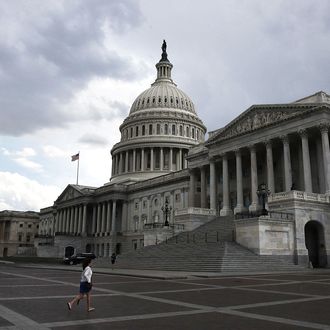
Across the internet yesterday, thousands of websites participated in a day of action to save net neutrality, the principle that prevents monopolistic internet-service providers from determining what you can and can’t access. The FCC is set to roll back regulations adopted in 2015 that protect consumers from ISP practices that favor certain services.
According to preliminary stats from Fight for the Future, one of the nonprofits spearheading the initiative, more than 10 million people yesterday were exposed to the protest messaging. That resulted in 1.6 million comments to the FCC. According to the statement put out yesterday evening, “The volume of participation was so high that the FCC has been ‘rate limiting’ submissions into their docket — there is an enormous number of comments queued up that will be submitted into its system before the July 17 deadline, as fast as its system can handle them.”
The open question now is whether such a high rate of support for net neutrality will have any influence over the FCC, which is proceeding apace. It is difficult not to be severely skeptical of Ajit Pai’s FCC, which, much like the rest of the federal government, appears to be acting in bad faith at the behest of corporate benefactors. I would love to be proven wrong.
For me, the real bright spot in yesterday’s protest is the “3,450,000+ emails” that Fight for the Future says were written to members of Congress. Internet access and regulation is becoming a growing political liability for elected officials who, unlike appointed FCC commissioners, are actually beholden to the will of their constituents. When Congress used the Congressional Review Act to unravel regulation that prevented ISPs from selling customer data to third parties, the swift and intense backlash surely sent a signal that the internet was no longer a curiosity, but something to be taken seriously. This has been true for decades, but the law moves much more slowly than technological progress.
So the FCC still seems likely to undo the 2015 Title II order, but the flip side of yesterday’s protest was sending a message to Congress that it should pick up the mantle and enshrine net neutrality in law, as opposed to government-agency regulation. That comes with its own set of hazards, not the least of which is the dysfunction that now grips both the House and the Senate, which have bigger legislative fish to fry. And of course, as T.C. Sottek points out at the Verge, elected officials love taking campaign donations from the telecom industry. The point is that there are other avenues for protecting net neutrality that don’t involve the FCC. For internet users more accustomed to instant gratification, it just might take a little more patience.





























